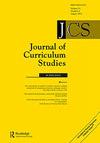考察查尔斯·达尔文在科学和历史课程中的代表性
IF 2
3区 教育学
Q1 EDUCATION & EDUCATIONAL RESEARCH
引用次数: 0
摘要
教学和学习是建立在适合年龄的、可靠的课程资源基础上的,这些资源可以是正式的(如教科书),也可以是非正式的(如商业书籍)。由于查尔斯·达尔文的思想激发了生物学和种族主义,本研究考察了他在商业书籍(如传记、叙事非小说类、说说性等)、教科书(学生版、教师版等)和课程补充(面向教师的评估和课程;面向学生的测试和任务)在美国出版。通过内容分析,我将历史学家对达尔文的理解与以历史为基础的贸易书籍(n = 111)和以生物学为导向的文本(n = 132)对达尔文的描述进行了对比。虚假陈述比比皆是。以历史为基础的书籍掩盖了达尔文的殖民主义过去,无视或不加限制地重复他作品中的种族主义思想。以生物学为基础的教科书在很大程度上忽略了达尔文过去有问题的方面。这些20世纪和21世纪的历史贸易书籍和科学教科书反映了19世纪美国社会研究教科书的“失败原因”逻辑和20世纪美国科学教科书的“反进化论诡辩”模式。经过审查的文本通过遗漏和委托,在达尔文的言语、行为和不作为中模糊了种族主义思想。在不同国家出版的课程资源中,由谁来决定历史和科学内容的包含、详细和省略的问题引起了人们的关注。本文章由计算机程序翻译,如有差异,请以英文原文为准。
Examining Charles Darwin’s (Mis)representation within science and history curricula
ABSTRACT Teaching and learning are grounded on age-appropriate, credible curricular resources, which can be formal (i.e. textbooks) and informal (i.e. trade-books). As Charles Darwin’s ideas galvanized biology and racism, this study examined his historical representation within trade-books (e.g. biography, narrative non-fiction, expository, etc.), textbooks (student editions, teacher editions, etc.), and curricular supplements (teacher-facing assessments and lessons; student-facing tests and tasks) published in United States. Through content analysis, I contrasted historians’ understandings of Darwin with history-based trade-books’ (n = 111) and biology-oriented texts’ (n = 132) depictions of Darwin. Misrepresentations abounded. History-based books concealed Darwin’s colonialist past and disregarded—or repeated without qualification and context—the racist ideas within his writing. Biology-based texts largely omitted problematic aspects of Darwin’s past. These 20th- and 21st-century history trade-books and science texts mirrored the patterns of 19th-century American social studies textbooks’ Lost Cause logic and 20th-century science American textbooks’ anti-evolution casuistry. Reviewed texts obscured the racist ideas within Darwin’s words, actions, and inactions, through both omission and commission. Concerns are raised about who determines how historical and scientific content are included, detailed, and omitted within curricular resources published in different countries.
求助全文
通过发布文献求助,成功后即可免费获取论文全文。
去求助
来源期刊

Journal of Curriculum Studies
EDUCATION & EDUCATIONAL RESEARCH-
CiteScore
4.70
自引率
4.80%
发文量
19
审稿时长
24 weeks
期刊介绍:
Journal of Curriculum Studies publishes conceptually rich contributions to all areas of curriculum studies, including those derived from empirical, philosophical, sociological, or policy-related investigations. The journal welcomes innovative papers that analyse the ways in which the social and institutional conditions of education and schooling contribute to shaping curriculum, including political, social and cultural studies; education policy; school reform and leadership; teaching; teacher education; curriculum development; and assessment and accountability. Journal of Curriculum Studies does not subscribe to any particular methodology or theory. As the prime international source for curriculum research, the journal publishes papers accessible to all the national, cultural, and discipline-defined communities that form the readership.
 求助内容:
求助内容: 应助结果提醒方式:
应助结果提醒方式:


